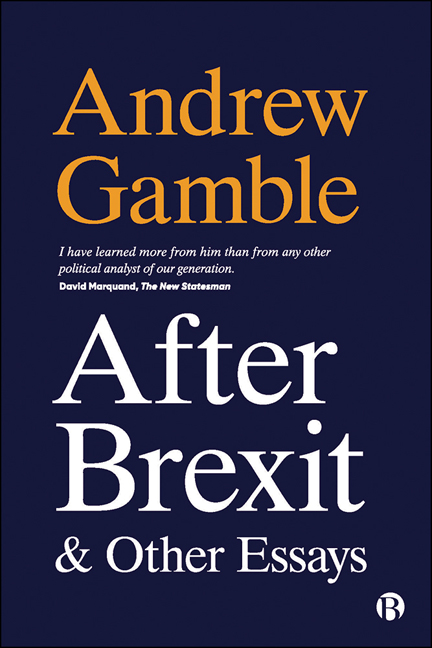Book contents
- Frontmatter
- Dedication
- Contents
- Preface
- Introduction: Historical Contexts
- Notes on the Essays
- 1 After Brexit (2019)
- 2 Explanations of British Decline (1999)
- 3 The European Disunion (2006)
- 4 The Anglo–American World View (2019)
- 5 The Free Economy and the Strong State (1979)
- 6 Thatcherism and Conservative Politics (1983)
- 7 Economic Growth and Political Dilemmas (1983)
- 8 The Crisis of Conservatism (1995)
- 9 The Thatcher Myth (2015)
- 10 Theories of British Politics (1990)
- 11 The Constitutional Revolution in the United Kingdom (2006)
- 12 What’s British about British Politics? (2016)
- Epilogue: Last Thoughts
- Notes
- Acknowledgements
- Index
10 - Theories of British Politics (1990)
Published online by Cambridge University Press: 22 December 2021
- Frontmatter
- Dedication
- Contents
- Preface
- Introduction: Historical Contexts
- Notes on the Essays
- 1 After Brexit (2019)
- 2 Explanations of British Decline (1999)
- 3 The European Disunion (2006)
- 4 The Anglo–American World View (2019)
- 5 The Free Economy and the Strong State (1979)
- 6 Thatcherism and Conservative Politics (1983)
- 7 Economic Growth and Political Dilemmas (1983)
- 8 The Crisis of Conservatism (1995)
- 9 The Thatcher Myth (2015)
- 10 Theories of British Politics (1990)
- 11 The Constitutional Revolution in the United Kingdom (2006)
- 12 What’s British about British Politics? (2016)
- Epilogue: Last Thoughts
- Notes
- Acknowledgements
- Index
Summary
One sure sign of an ill-conducted state is the propensity of the people to resort to theories.
Edmund BurkeCourses on British politics, like courses on English literature, have become embedded in institutions of higher education. They sometimes seem as natural and inevitable as the weather. But are there good intellectual reasons rather than expedient ones why students should be asked to study British politics rather than the politics of some other country? What do political scientists study when they study British politics? Is Britain chosen because it is a unique phenomenon, with its own institutions and special characteristics? Or is it chosen because its politics provide case studies which can contribute to general theories of comparative politics? Britain may have its local peculiarities but are these better understood as manifestations of a unique political entity or of a set of universal concepts?
A glance at the available literature reveals that there is no longer any consensus on the answers to these questions. The current variety of approaches and perspectives stems from the influence on the development of the discipline exerted by intellectual traditions in other countries, notably the United States, as well as from the response of political scientists to developments in British politics during the last two decades. One consequence has been to make writing on British politics more self-conscious about theory and methods. In the past much of the writing was deliberately atheoretical and this tradition continues. But it is under increasing challenge.
The textbooks have become quite diverse, both in the range of topics they include and in their methodological and ideological orientation. There is no longer a single body of knowledge or interpretation to which the student is directed. The cause is partly the sheer volume of writing on British politics but more fundamentally it stems from the fact that there is no longer a single ‘organising perspective’ which guides teaching and research.
This loss of an agreed core disturbs many political scientists, who look back to a time when there was broad agreement on what British politics was about. Yet the degree of consensus is easily exaggerated. There have always been theoretical debates about how best to study British politics and much variety of methods and topics.
- Type
- Chapter
- Information
- After Brexit and Other Essays , pp. 193 - 212Publisher: Bristol University PressPrint publication year: 2021



